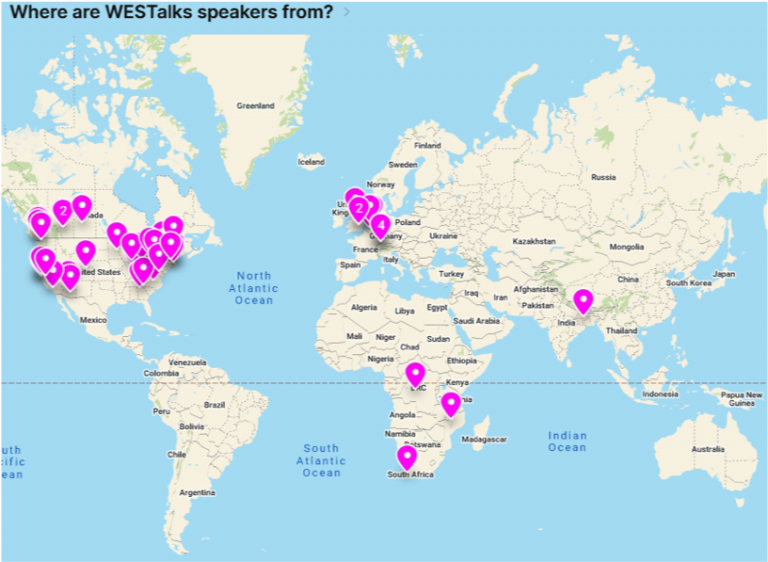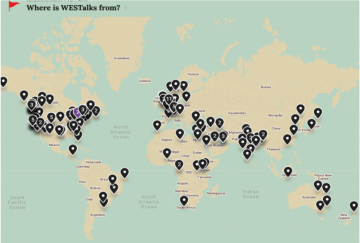
Emerging from the groundwork established by the WEST conference, the WESTalks seminars were created to extend the conference’s interdisciplinary vision to ongoing, collaborative efforts in addressing water challenges. These seminars recognize the complex nature of water issues, which intersect with climate science, governmental boundaries, cultural and scientific values, economics, and more. Hence, WESTalks encourages the development of holistic approaches for creating equitable water solutions, uniting water researchers from various disciplines, cultures, and geographies. This initiative promotes a shared understanding of the contributions each participant can make and underscores the importance of collaboration in addressing water-related challenges.
Diversity in academic and cultural experiences forms the cornerstone of WESTalks, and we are thrilled to invite you to this dynamic platform where you can gain insights from water experts worldwide. The “WESTalks: Global Perspectives on the Future of Water” forum is designed to expose participants to the myriad challenges, methodologies, and leading solutions in the water sector, often vastly different from their own experiences.
From July 2020 to June 2022, the WESTalks water seminars were conducted virtually every Thursday, hosted by UBC Future Waters and IC-IMPACTS. The series was meticulously organized by a committee of dedicated graduate students: Karl Zimmermann, Fuhar Dixit, Leili Abkar, Abhishek Dutta, Jaskaran Dhiman, and Kelsey Shaw.
Notes on the organization of this WESTalks course:
|
Learning goals- the WESTalks: Global Perspectives on the Future of Water course aims to…
|
Fun facts about WESTalks:

64 WESTalks speakers came from 49 organizations and ten countries. |
|
 Over 700 WESTalks participants joined from 35 countries (map from June 2022). |
WESTalks Global Map of participants:
If you learned something interesting from the WESTalks, please check into our global WESTalks map by clicking on the red ‘plus’ sign on bottom-right and typing in your city or university name:
Any questions about WESTalks can be directed to Karl Zimmermann at info@west-conference.ubc.ca.
WESTalks Modules included on this page:
- 0: WESTalks: Future Water Big Visions
- 1: Water and the Environment
- 2: Urban Water/ Water Reuse/ Resource Recovery
- 3: Principles of Water Treatment
- 4: Water and Society
- 5: Sustainable Development (WASH): Low tech for big solutions
- 6: The Biology of Water
- 7: Emerging Contaminants
Module 0. WESTalks: Future Water Big Visions
All of the WESTalks speakers shared an introduction to their water research and big ideas. The first module of the WESTalks course shares visions are achieving a resilient, equitable and sustainable water future, by globally-renowned water leaders.
The Next Way of Solving the World’s Water Problems |
||
Dr. David SedlakUniv. of California Berkeley June 09, 2021 (*Keynote at 2021 WEST Conference) Water use; water, society and technology; Digital water; Desalination brine management; Non-grid water supply; Future of Water |
|
|
Sustainability transitions in the urban water sector: The promise of modular technologies from socio-technical perspective. |
||
|
Dr. Bernard TrufferEAWAG, Utrecht Univ. September 24, 2020 centralized vs. decentralized water systems; sustainability transitions; |
|
Twenty Years of GRACE Observations of Changing Freshwater Availability and Challenges for Sustainability |
||
Dr. Jay FamigliettiUniv. of Saskatchewan June 10, 2022 *Keynote at 2022 WEST Conference
Groundwater; Remote Sensing; Sealevel; Water availability; |
|
|
COVIDPoops19 and Beyond: Origin, Evolution, and Equity |
||
|
Dr. Colleen NaughtonUniv. of California Merced May 26, 2022 Wastewater Based Epidemiology; Big Data in water; Coordination amongst water sector |
|
Which disinfection by-products matter during potable reuse? |
||
Dr. William MitchStanford Univ. October 29, 2020 water reuse; emerging contaminants |
|
|
Module 1. Water and the Environment
Water comes from the environment, flows through the environment and ultimately is returned to the environment. This module discusses environmental water availability and quality, the sustainable use of water and how water and other environmental resources are intrinsically connected, especially including advances in resource recovery.
Twenty Years of GRACE Observations of Changing Freshwater Availability and Challenges for Sustainability |
||
Dr. Jay FamigliettiUniv. of Saskatchewan June 10, 2022 *Keynote at 2022 WEST Conference Groundwater; Remote Sensing; Sealevel; Water availability; |
|
|
Human Imprints on (Trace) Metal Cycling in the Great Lakes |
|||
|
Dr. Bas VriensQueens Univ. May 20, 2021 Metals in aquatic environment; |
||
Regime shifts in aquatic ecosystems: theory and experimental tests at ecosystem scale |
||
Dr. Leland JacksonUniv. of Calgary May 27, 2021 Ecosystem Stability; lake turbidity; macrophytes |
|
|
Urine: The liquid gold of wastewater |
|||
|
Dr. Dyllon RandallUniv. of Cape Town February 25, 2021 Sanitation; Resource recovery; waste valorization |
||
Designing Distributed Nitrogen Recovery from Wastewater |
||
Dr. William TarpehStanford Univ. April 08, 2021 Resource Recovery; Nitrogen recovery; Ammonium; Wastewater |
|
|
Module 2. Urban water, water reuse and resource recovery
As population size and growing urban centres put pressure on our water resources, this WESTalks module shares leading ideas on water-sustainable cities, including advances in potable reuse and recovering resources from ‘waste’water.
De Facto Reuse: Are we drinking treated wastewater? |
||
Dr. Paul WesterhoffArizona State Univ. August 07, 2020 water reuse; emerging contaminants |
|
|
Treatment technologies and monitoring strategies for contaminants of emerging concerns (CECs) in potable water reuse. |
|||
|
Dr. Minkyu ParkUniv. of Arizona January 21, 2021 potable reuse |
||
Cost-Effective, Engineered and Sustainably-Produce Media for Stormwater Runoff Treatment |
||
Dr. Jessica RayUniv. of Washington March 04, 2021 Urban stormwater management; Stormwater contaminants; Iron-mediated oxidation; Biochar; PFAS adsorption |
|
|
Water sector electrification: System-level benefits and process-level challenges |
|||
|
Dr. Meagan MauterStanford Univ. March 04, 2021 Energy use in water treatment; Decentralization; Decarbonization; Electro-coagulation; Demand-response |
||
Transitioning to Blue Green Cities: Harmonising nature-based approaches with smart urban water management and multi-functional planning |
||
Dr. Peter BachEAWAG March 11, 2021 Blue Green Cities; Urban planning; Sustainable Infrastructure |
|
|
COVIDPoops19 and Beyond: Origin, Evolution, and Equity |
|||
|
Dr. Colleen NaughtonUniv. of California Merced May 26, 2022 Wastewater Based Epidemiology; Big Data in water; |
||
Extracellular Polymeric Substances |
||
Dr. Mark Van LoosdrechtDelft Univ. of Technology February 11, 2021 EPS; Biofilm composition; resource recovery- EPS; biopolymers |
|
|
Elucidating and engineering microbiomes to valorize exopolymers from wastewater |
|||
|
Dr. David WeissbrodtTechnical Univ. of Delft June 02, 2022 Resource recovery; microbiomes; |
||
Moving Beyond Resilience by Considering Antifragility in Potable Water Systems |
||
Dr. Joe GoodwillUniv. of Rhode Island March 10, 2022 |
[no video available] | |
Deciphering Waste: the Management and Informative Power of Microbial and Chemical Wastewater Constituents |
|||
| [no video available] |
Dr. Cresten MansfeldUniv. Colorado Boulder January 13, 2022 |
||
Module 3. Principles of Water Treatment
Today, there exists a plethora of innovative water treatment technologies, from sand filters developed by the Romans to bio-treatment process we are only now starting to understand. This WESTalks module offers an introduction to many long-trusted technologies and novel treatment strategies.
Biofiltration: Where we’ve been, where we are and where we are going? |
||
Dr. Mike McKieUniv. of Toronto July 30, 2020 biofiltration; drinking water; wastewater; |
|
|
Drinking water biofilters: A source of clean water and novel microbial physiologies |
|||
|
Dr. Jane FowlerSimon Fraser Univ. April 01, 2021 biofiltration; drinking water; microbial community diversity; |
||
How I learned to stop worrying and love the biofilm |
||
Dr. Jeseth Delgado VelaHoward Univ. Feb 24, 2022 Wastewater; Biological nitrogen removal; |
|
|
Next Generation Desalination Membranes: Where are we Now? |
|||
|
Dr. Menachem ElimelechYale Univ. August 13, 2020 membranes; perm-selectivity trade-off; reverse osmosis; thin film composite membranes |
||
Membranes Under Pressure: Membranes in Drinking Water Treatment |
||
Dr. Emile CornelissenKWR Water Institute, Ghent Univ. August 27, 2020 Membrane desalination; fouling; RO pre-treatment; perm-selectivity |
|
|
Putting bubbles to work: Emerging applications of hydrophobic membranes in water treatment and power generation |
|||
|
Dr. Anthony StraubUniv. Colorado Boulder February 18, 2021 membrane treatment; vapour gap membranes; membrane polarization; reverse osmosis |
||
Ion Exchange Applications for Drinking Water and Wastewater Treatment |
||
Dr. Treavor BoyerArizona State Univ. November 05, 2020 Ion Exchange; NOM; PFAS; Multiple species removal; |
|
|
Sustainable Materials for Advanced WateR Treatment (SMART) in the 2020s |
|||
|
Dr. Nirupam AichUniv. of Buffalo January 27, 2022 Nanomaterials; PFAS Adsorption; PFAS Degradation; rGO-NZVI |
||
Peptide-enabled filtration for waterborne pathogen control |
||
Dr. Boya XiongMassachusetts Inst. of Tech., Univ. of Minnesota September 17, 2020 Disinfection; sand filtration; f-sand filters; moringa seed filter |
|
|
New insights into the effects of micron-scale microplastics on membrane-based treatment processes |
|||
| [no video available] |
Dr. David LatulippeMcMaster Univ. April 29, 2021 |
||
Heterogeneous Diffusion of Nanoparticles in Biofilms |
||
Dr. Caitlyn ButlerUniv. Massachusetts Amherst Mar 24, 2022 |
[no video available] | |
Module 4. Water and Society
It is people who thrive from the happiness and health of enjoying safe water. Water is intrinsically connected to society and we need to remember that there is always a human impact of water decisions. This module shares the stories, challenges and peoples’ experiences with water.
The Human Right to a Healthy Environment and the Global Water Crisis |
||
Dr. David BoydUniv. of British Columbia, United Nations Special Rapporteur on Human Rights and the Environment June 10, 2021 Water stress; Climate Change; Rights-based approach; United Nations; |
|
|
Techno-Ecological Approaches for Treatment Resilience and Drinking Water Security in a Changing Climate |
|||
|
Dr. Monica EmelkoUniv. of Waterloo December 02, 2021 Nature-based solutions; socio-technical; climate resiliency; Wildfires; Source water protection |
||
Tip of the Iceberg – Water, Health, and the Growing Divide in Canadian Indigenous Communities |
||
Dr. Kerry BlackUniv. of Calgary 06 May, 2021 Clean drinking water supply; Drinking water advisories; First Nations Water Crisis |
|
|
Towards Watershed Security: Fresh Thinking about Governance, Water Law, and the Future |
|||
|
Dr. Oliver Brandes and Rosie SimmsPOLIS Water Sustainability Project, Univ. of Victoria June 11, 2021 Water Stress; Water Governance; Water law; Rights-based approach; UNDRIP |
||
Water Equity and Compliance with the Safe Drinking Water Act |
||
Dr. Maura AllaireUniv. of California Irvine November 04, 2021 Drinking water service disparities; Water justice; |
|
|
Disaster Challenges and Opportunities: Safely and Rapidly Recovering Drinking Water Systems |
|||
|
Dr. Andrew WheltonPurdue Univ. June 11, 2021 Drinking water supply in natural disaster response; Policy response; |
||
Drinking Water Supply Challenges in Remote Arctic Communities |
||
Dr. Alexandra CassiviUniv. of Laval December 16, 2021 Case study: Water access in a trucked water supply community in Nunavik, (Canada) |
|
|
Module 5. Sustainable Development (WASH): Low tech for big solutions
“At the current rates of progress, 1.6 billion people will lack safely managed drinking water, 2.8 billion people will lack safely managed sanitation, and 1.9 billion people will lack basic hand hygiene facilities in 2030” (United Nations, Goal 6: Ensure access to water and sanitation for all). The United Nation’s Sustainable Development Goal SDG6 seeks to provide safe water and sanitation for all by 2030. This requires innovative technologies, combined with an understanding of the social, economic, cultural, historical and the many dimensions which are unique to each community. This WESTalks module shares stories, challenges, local solutions, and ideas on sustainable water development.
Using Feedback to Improve Accountability in Global Environmental Health and Engineering. |
||
Dr. Evan ThomasUniv. of Colorado Boulder February 04, 2021 Global health; behaviour change; water use trends; remote monitoring; |
|
|
Why Shit Matters, TEDx*Original WESTalks title: Emerging Solutions to Urban Sanitation in the Global South |
|||
|
Dr. Christoph LüthiEAWAG, Sandec department July 09, 2020 Sanitation; non-sewered sanitation; Resource Recovery; shit flow diagram |
||
Innovations in Faecal Sludge Management |
|||
Dr. Linda StrandeEAWAG, Sandec department March 25, 2021 Faecal sludge management; FSM; Sanitation; CWIS; sustainable sanitation |
|
||
Trash: It’s role in sanitation and resource recovery |
|||
|
Dr. Elizabeth TilleyETH Zurich, EAWAG, Univ. of Malawi September 12, 2020 sanitation; faecal sludge management; Resource recovery from urine |
||
Pitfalls and Progress: Research to Move Towards Safe and Sustainable Sanitation for All |
||
Dr. Mike TempletonImperial College London July 16, 2020 sanitation; vermicomposting; sustainable sanitation model; monitoring pit latrines; biogas
|
|
|
Rainwater Harvesting in Practice |
|||
|
Dr. Ilan AdlerUniv. College London November 18, 2021 Rainwater harvesting; water storage; silver ionization disinfection; |
||
Point of Use: A case study in Longido, Tanzania |
||
Dr. Onita BasuCarleton Univ. October 01, 2020 community engagement; point of use; pilot testing; Ceramic filters; socio-technical considerations |
|
|
From Plumbing Poverty to Plumbing Violence: Water Security and Gender-Based Violence in the Global South |
||
|
Dr. Susan ElliotUniv. of Waterloo June 08, 2022 Water Access; Gender; Violence; WASH disease classification; |
|
Water, Sanitation, Hygiene and Engineering in Outbreaks |
||
Dr. Daniele LantagneTufts Univ. November 12, 2020 Humanitarian; WASH; Infectious disease; Ebola; handwashing |
|
|
Building Human Capacity |
|||
|
Shauna CurryCentre for Affordable Water and Sanitation Technologies, CAWST June 09, 2022 *Keynote from 2022 WEST Conference
|
||
Challenges to reducing waterborne diseases in developing communities in the coming decade: the case of DRC (Democratic Republic of Congo) |
|||
Dr. Patrick MirindiWorld Health Organization July 23, 2020 Public Health; Waterborne disease; Cholera
|
|
||
Role of infrastructure including sanitation for human well-being and links with SDGs |
||
|
Dr. Priti ParikhUniv. College London April 22, 2021 Sustainability; infrastructure |
|
Reimagining Engineering in Service to Populations Vulnerable to WASH, Climate Change and Planetary Health Impacts |
|||
Susan MurcottMIT, D-Lab October 22, 2022 WASH; Planetary Health; Planetary Boundaries; SDG; MDG |
|
||
Rapid growth and low tax base? Why “engineering” is only part of the solution to urban WASH in the global south |
||
| [no video available] |
Dr. Barbara EvansUniv. of Leeds October 15, 2020 |
|
Applying the Systems Lens to Rural Water Service Delivery |
|||
Dr. Pranav ChintalapatiUniv. Colorado Boulder May 19, 2022 |
[no video available] |
|
|
Module 6. The Biology of Water
If the first thousand years of water treatment focused on physical treatment (i.e., sand filters) and the most recent century developed chemical treatments (chlorine disinfection, membranes, etc.), then the next century will be the century that we master biological water treatment. Presently, we are understanding the biology of water and beginning to learn how to engineer it to fit our safe water and sanitation needs.
Managing unwanted microbial growth in building plumbing systems |
||
Dr. Fredrick HammesEAWAG, ETH Zurich May 13, 2021 biofilms; water distribution system; microbial water quality; premise plumbing |
|
|
The metabolic landscape of the drinking water microbiome |
|||
|
Dr. Ameet PintoNortheastern Univ. June 03, 2021 Drinking water microbiome; disinfection; antimicrobial resistance; metabolic capacity |
||
Bacteria Transport: Biofilm structure and Metabolic Response to Stress |
||
Dr. Andrew Jones IIIDuke Univ. Sept 23, 2021 Biofilms; Microbial Fuel Cell; |
|
|
Researcher-Utility Partnerships for Advancing Microbial Drinking Water Quality |
|||
|
Dr. Lutgarde RaskinUniv. of Michigan Ann Arbour January 14, 2021 Water microbiology; ozone disinfection; gene expression |
||
Module 7. Emerging Contaminants
With advances in contaminant detection and toxicity, we are learning about a need to treat for new, or emerging, contaminants. This WESTalks module introduces what we know so far, current regulations (*which are evolving each year), and advances in treatment options.
Which disinfection by-products matter during potable reuse? |
||
Dr. William MitchStanford Univ. October 29, 2020 water reuse; emerging contaminants |
|
|
Disinfection By-product Formation in Drinking Water and Recycled Wastewater |
|||
|
Dr. Daniel McCurryUniv. of Southern California October 08, 2020 Disinfection by-products; THM; HAA; NDMA |
||
Controlling Trihalomethane Formation in Drinking Water Supple – A Case Study of India |
||
Dr. Sunil GuptaIndian Institute of Technology, Dhanbad November 19, 2020 DBP; trihalomethanes; |
|
|
Chemical destruction of aqueous per- and poly-fluoroalkyl substances (PFAS): Are PFAS truly “forever chemicals”? |
|||
|
Dr. Michael BentelClemson Univ. October 07, 2021 PFAS; PFAS destruction; UV-Sulfite defluorination |
||
Efficient PFAS Removal by Amine- functionalized Sorbents: Promises & Challenges |
||
Dr. Mohamed AteiaNorthwestern Univ. January 28, 2021 PFAS; hydrophobic interactions; electrostatic interactions; MOF; |
|
|
PFAS treatment strategies |
|||
|
Dr. Jenny ZenobioUniv. of California Irvine April 21, 2022 PFAS; Zero Valent Iron; PFAS mineralization; |
||
PFAS: the Forever One Water Chemical |
||
Dr. Samantha BlackHDR Inc.) April 15, 2021 PFAS; industrial case study |
|
|
Trace Contaminants in Potable Reuse: An RO Concentrate Treatment Perspective |
|||
| [no video available] |
Dr. Rachel ScholesUniv. of California Berkeley, Univ. of British Columbia August 20, 2020 |
||
Recommended citation:
For content from each presentation, you may cite each WESTalks presenter name, their presentation title, and presentation date.
For referencing to the WESTalks Global Water Seminars, you may use:
K. Zimmermann, F. Dixit, L. Abkar, A. Dhutta, J. Dhiman and K. Shaw. WESTalk Water Course: WESTalk: Global Perspectives on the Future of Water, University of British Columbia, July 2023.
